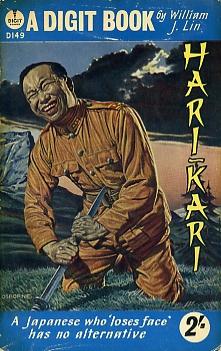
William J. Lin
Hari-Kari
(When he 'loses face' a Japanese has no alternative)
London: Brown Watson Ltd., [1958]
158 pages, paperback (Digit Books D149)
The First Sino-Japanese War (1894-1895) was fought mostly in Korea, southern Manchuria, and northern China. The Second Sino-Japanese War (1937-1945) began with Japan's 1931 invasion of Manchuria, but hostilities did not jump to the level of a full-scale war against China until the Marco Polo Bridge Incident of 1937.
Teaser on fly
Japanese forces overran Nanching [Nanjing] and advanced up the Yangtse [Yangtze, Yangzi] as far as Wuhan. Hankow [Hankou], one of the three cities that make up Wuhan today, was invaded and occupied during Battle of Wuhan in the summer and fall of 1938.
The next major battle took place at Nanchang, a railway center and the site of a Chinese airbase, just south of the Yangtse, closer to Wuhan than Shanghai, in the spring of 1939. These details are found in the teaser which appears on both the back cover and front fly. The fly, however, also includes a comment about the spelling of harakiri.
|
Hari-Kari
Here we have a harrowing and combat-filled story of the Sino-Japanese war. It opens with an air raid on Hankow, which city is being reduced to rubble by incessant Japanese bombing.
The central character of the book is Prince Wang, a Captain in the Eighth Route Army, who is in charge of the Chinese Anti-Aircraft Forces. He purchases arms through Hong Kong from an international ring, which is run by French nuns, having already been swindled by an Italian armaments agent, who sold him 'dud' guns and shells.
The action covers the fall of Canton, the siege of Hankow and the Yangtse-Nanchang battle, where the Japanese used gas. In the end Wang gets his own back on the dishonest Italian, but is himself thoroughly disillusioned by his superiors' policy of retreat and the fact that they will, in no circumstances, arm the teeming millions of coolies, preferring to face defeat rather than do so.
[AUTHOR'S NOTE: Whilst, strictly speaking, the correct spelling of the act of suicide denoted by the title of this book is hara-kiri, this is more commonly pronounced hari-kari by Europeans and has, accordingly, been changed in the title only and not in the text.]
|
China committing harakiri
The novel ends on a highly critical and pessimistic note with regard to how China's leaders are conducting the war of defense against Japan (page 158).
|
"Things aren't as bad as they seem," [Colonel Schneider] soothed. "Haven't you heard the news from Canton?"
"No," Wang replied, dreading the worst. "Have they advanced on Kowloon now?"
"Cantonese troops have surrounded Canton and counter-attacked. The enemy hold only a small part of the city and we expect to recapture it any day."
Want was not to be cheered, however. He had seen too much of the futility of China's war effort. Even as he stared across the bleak expanse of No Man's Land he could see thousands of weary, defeated troops pouring back from the mountain front.
In his mind's eye, he could picture the same scene here in this new line in two or three weeks' time. And so it would go on -- just so long as the Government refused to put guns into the hands of their four hundred million citizens.
The Japs would continue to advance and the Chinese would continue to retreat.
And Wang thought of the Japanese colonel who had committed hara-kiri. Japanese individuals might commit suicide; but, here in China, it was the country itself that was committing hara-kiri.
THE END
|
While China claims victory in the Second Sino-Japanese War, and though China has reason to be proud of its resistance against Japan's aggression, the war was not won in China. The military situation in China had stagnated by the time Japan surrendered to the Allied Powers, which included the Republic of China. However, China was able to achieve a military stalemate against Japan only because Japan had to divert its forces and resources to the Pacific War.
|
